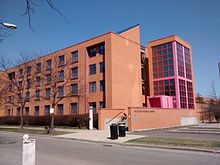Max Palevsky
Max Palevsky (July 24, 1924 – May 5, 2010) was an American art collector, venture capitalist, philanthropist, and computer technology pioneer.
[1] He was known as a member of the Malibu Mafia – a group of wealthy American Jewish men who donated money to liberal and progressive causes and politicians.
After graduating from public high school in Chicago, Palevsky volunteered for the US Army Air Corps as a weatherman during World War II and served from 1943 to 1946.
Between March 1950 and January 1951, he built copies of the MADIDDA, a special-purpose computer intended to solve differential equations.
[8] Priced from $25,000 to $30,000, MADDIDA would prove to be the last and most sophisticated dedicated differential analyzer ever built once all attention soon turned to electronic computers.
In April 1960, Packard-Bell Computer Corp. and Bailey Meter Co. signed an agreement for the exclusive application of PB250's in the control of power plants.
Palevsky gave many lectures during this period, including at the second international meeting on analog computation at Strasbourg, France, in September 1958.
Palevsky felt that ten percent of the market of small to medium size scientific and process control computers was being totally neglected.
He left Packard Bell with eleven associates from the computer division to found Scientific Data Systems of California in September 1961.
On March 15, 1966, they introduced the Sigma 7, the first of a family of machines that marked the full-scale entry of the company into new areas of business data processing, time sharing, and multiprocessing.
[9] In 1972 Palevsky donated $319,000[2] to George McGovern,[10] and in 1973 he managed Tom Bradley's first successful campaign for mayor of Los Angeles.
He made numerous friends and allies on the California political scene, including former governor Gray Davis,[11] and was elected to serve on Common Cause's National Governing Board in 1973.
He said to Newsweek: "I am making this million-dollar contribution in hopes that I will never again legally be allowed to write huge checks to California political candidates.
Palevsky became a director along with Arthur Rock, who helped bankroll SDS, at the company's founding, on July 18, 1968, as NM Electronics Corporation, a name later changed to Intel (August 6, 1968).
Palevsky also became a director and chairman of Rolling Stone, which he rescued from financial ruin in 1970 by buying a substantial share of the stock.
Palevsky produced and bankrolled several Hollywood films, including Fun with Dick and Jane and Islands in the Stream both with Peter Bart in 1977, and Endurance in 1998.
Three California Houses: The Homes of Max Palevsky featured architecture and design by Ettore Sottsass of the Memphis group, Craig Ellwood, George Washington Smith, and Coy Howard.
